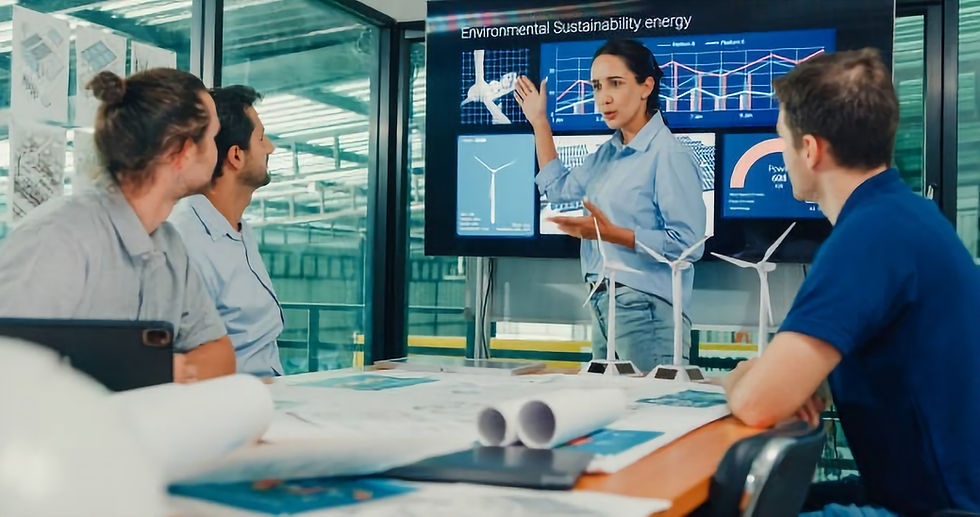Urban Sustainability – How Businesses Can Grow
- Brainz Magazine

- Jun 19, 2024
- 4 min read
Updated: Mar 9, 2025
Written by Wayne Elsey, Founder and CEO
Wayne Elsey is the founder and CEO of Elsey Enterprises. Among his independent brands, he is also the founder and CEO of Funds2Orgs.

We’re at a crossroads. Cities like New York have instituted congestion pricing in our cities. Other cities like San Diego and Washington D.C. are transforming themselves with urban sustainability. Further, companies of all sizes are experiencing customers and the general public asking them to lead with sustainable solutions. In short, being eco-friendly is how leading companies of any size give back to their communities and make a better profit.

The more the federal and local governments push for sustainable solutions, the more we'll see it in every aspect of business. As a result, urban sustainability is a chance for business leaders to do the right thing as the planet focuses on environmental responsibility. In turn, the increased focus on being green allows companies to increase social impact and improve opportunities to become leaders in the market.
Benefits of urban sustainability for businesses
Urban sustainability presents businesses with a lot of benefits. Those include ensuring environmental compliance to improved marketing for engaging consumers and increasing engagement. This forward-thinking approach to sustainability shows a company’s commitment to the environment and it also creates a community leadership opportunity. Further, being eco-friendly increases brand loyalty, saves costs, and motivates teams.
1. Brand reputation and customer loyalty enhancement of companies
Companies leading in urban sustainability often cite the positive impact on their brand reputation and its effect on enhancing customer loyalty. The fact is that consumers increasingly seek to patronize and do business with companies committed to the environment and social responsibilities.
2. Operational efficiencies and cost savings for businesses
When a company focuses on being green, there are plenty of operational and cost efficiencies. For example, any business can look to be headquartered in an energy-efficient building or reduce waste. Those cost-savings make business leaders and their companies innovative within their industry.
3. Talent satisfaction and retention
Companies that drive sustainability often record high employee satisfaction. That’s because their teams feel aligned with the social and environmental values of the business. In turn, it improves the rate of retaining employees. Further, it attracts top talent seeking to work in responsible companies.
How businesses can support sustainable urban development
Supporting urban sustainability shows how much a company cares about environmental stewardship. It also demonstrates how it aligns itself with economic resilience and social well-being. Fortunately, there are many ways for businesses to contribute to creating sustainable and livable cities. The following are some ideas to consider.
1. Green construction and building practices
Businesses with an expansion or even renovation plans can use green building practices. These improvements range from using sustainable materials to investing in energy-efficient infrastructure. They also include including innovative uses of green spaces.
2. Promotion of sustainable transport by companies
By providing incentives, companies can seek to increase employee use of alternative sustainable transport modes. Think of things like carpooling, bikes, or public transit. Some incentives can include providing secure bike racks or even electric vehicle charging stations.
3. Urban farming
Engaging in or supporting urban farming projects enables businesses to contribute to local food sustainability. It also promotes green spaces in society. Partners can support everything from small herb gardens in office spaces to local urban farms.
4. Sustainable supply chain management
By ensuring sustainability in the supply chain, companies audit environmental conditions and ethical labor practices, among other things. These audits should include local sourcing to reduce transportation emissions and supporting local suppliers.
5. Community engagement and education by companies
Businesses can educate and engage the community on sustainability. For instance, they can organize workshops or sponsor local community sustainability initiatives. They can also partner with schools to educate students.
6. Investment in green technologies
Investing in green tech means minimizing its environmental impact while contributing to toward sustainable innovation. Some ideas may involve renewable sources of power, water recycling systems, and smart building technologies.
The path forward toward eco-friendly business
Urban sustainability requires joint social and business partnerships. Still, these partnerships can greatly benefit companies by helping them increase brand image, retain talent, and lower costs. Moreover, for business leaders in the community, it's an opportunity to position themselves as community leaders and positively impact their city's present and future. In short, it's no longer about corporate social responsibility but strategic business opportunities for community well-being and business success.
© 2024 Wayne Elsey. All Rights Reserved.
Wayne Elsey, Founder and CEO
Wayne Elsey is the founder and CEO of Elsey Enterprises. Among his independent brands, he is also the founder and CEO of Funds2Orgs. This social enterprise helps nonprofits, schools, churches, civic groups, individuals, and others raise funds while helping to support micro-enterprise (small business) opportunities in developing nations and the environment.









